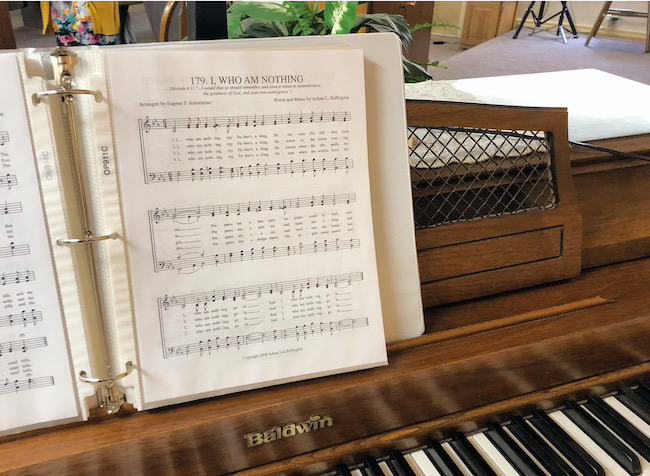While many of us have a favorite hymn from the beautifully inspired hymns of praise that have touched our hearts and brought tears to our eyes, The Songs of Zion are unique to our Church. They are songs that belong to a new time; they belong to a new era; they belong to our people. They are songs sent from the throne of God as a gift to The Church of Jesus Christ. They are inspirational and related to Christ and His promises of the latter-day times and events. This gift was given to our late Sister Arlene Buffington, as our songs of hope and joy, looking forward to the fulfillment of the kingdom of Zion, bathed in the latter-day glory of the restoration.
Today I’d like to look at No. 179, “I, Who Am Nothing” by looking at the meaning and application of the song, because it’s too easy to sing without paying attention to the words and their meaning.
VERSE 1
I, who am nothing, my Father’s a king, He rescues His children from sin, Prepares me a banquet, No prince could afford, And I, who am nothing, go in. And I, who am nothing, go in.
VERSE 2
I, who am nothing my Father’s a king, He watches the storm coming in, Prepares me a shelter and leads me along, And I, who am nothing, go in. And I, who am nothing, go in.
VERSE 3
I, who am nothing my Father’s a king, He knows when the dry spells begin, Prepares an oasis and beckons me “come,” And I, who am nothing, go in. And I, who am nothing, go in.
VERSE 4
I, who am nothing my Father’s a king, He sees when the wolves leave the den, Prepares me a hedge where His angels stand guard, And I, who am nothing, go in. And I, who am nothing, go in.
©2008 Arlene Lea Buffington
Doesn’t the melody of this hymn have a humbling tone to it as we listen to or sing it? And to support these sweet notes, the words remind us over and over again that even though we are “nothing,” we are considered royalty, because our father is the King! And despite our sinful ways, despite the storms of life that come before us, despite the dry spells when we feel helpless, despite the dangers (seen and unseen) that we face, our father (our Savior and our Redeemer) takes care of us. Despite our nothingness, He invites us in—in for the banquet, in to the shelter, in to the oasis, and in to the hedge where His angels stand guard. He provides for our natural and spiritual needs … all this and He never stops loving us!
King Benjamin said: “And again I say unto you as I have said before, that as ye have come to the knowledge of the glory of God, or if ye have known of his goodness and have tasted of his love, and have received a remission of your sins, which causeth such exceedingly great joy in your souls, even so I would that ye should remember, and always retain in remembrance, the greatness of God, and your own nothingness, and his goodness and long-suffering towards you, unworthy creatures, and humble yourselves even in the depths of humility, calling on the name of the Lord daily, and standing steadfastly in the faith of that which is to come, which was spoken by the mouth of the angel.” (Mosiah 4:11)
This is a beautiful reminder of how important it is to stay humble. Admittedly, humility and the humbling of oneself is out of fashion in today’s world and seems unappealing to most. Why? Because it suggests weakness, but the Scriptures tell us again and again, “humble yourselves, and I will exalt you.” This gives me hope and encouragement because the Lord takes great pleasure in our efforts to humble ourselves, and He loves to bless and exalt the humble.
Finally, let me offer this perspective on humility (nothingness) because I believe it can help everyone when we consider and meditate on the greatest example of humility in history: Jesus Christ. By the very act of leaving heaven, coming to earth, and taking the form of man, He demonstrated a nearly incomprehensible humility.
Throughout His life on earth, Jesus demonstrated a spirit of humility by saying, “Even as the Son of man came not to be ministered unto, but to minister, and to give his life a ransom for many” (Matthew 20:28). On His last night with His disciples in the upper room, remembering the feast of the Passover, He took a towel and basin, knelt down before them, and washed their filthy feet, instructing them to follow His example of servanthood (John 13:1–17).
And yet through it all, I still hear the repeat, reminding me that “I, who am nothing, go in. And I, who am nothing, go in.”
This article has undergone ministry review and approval.





0 Comments